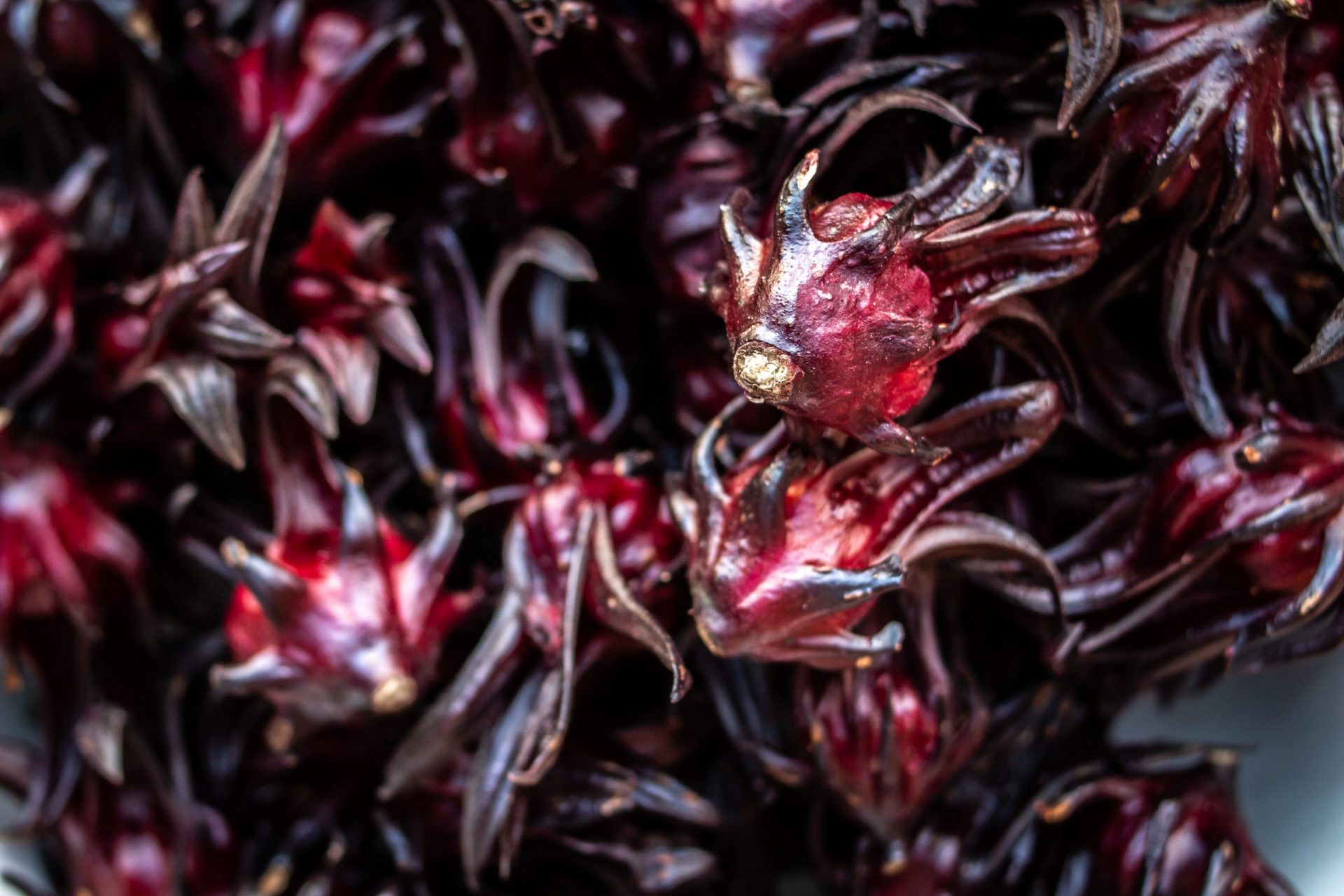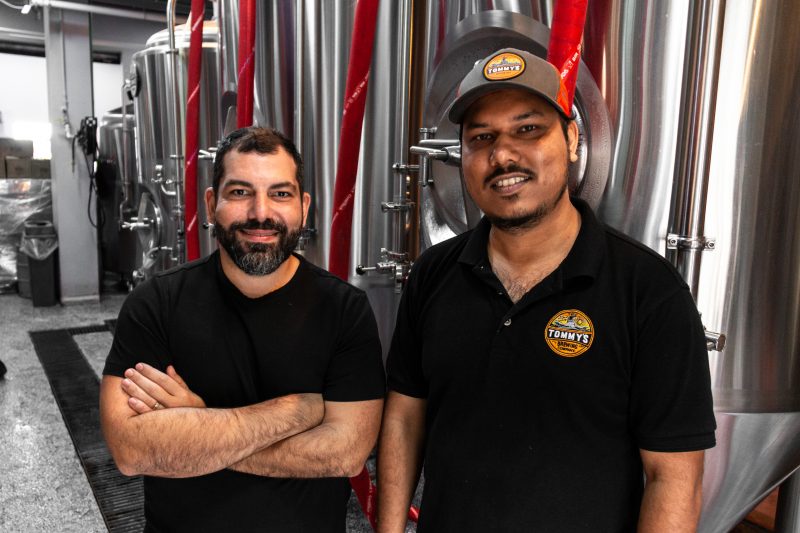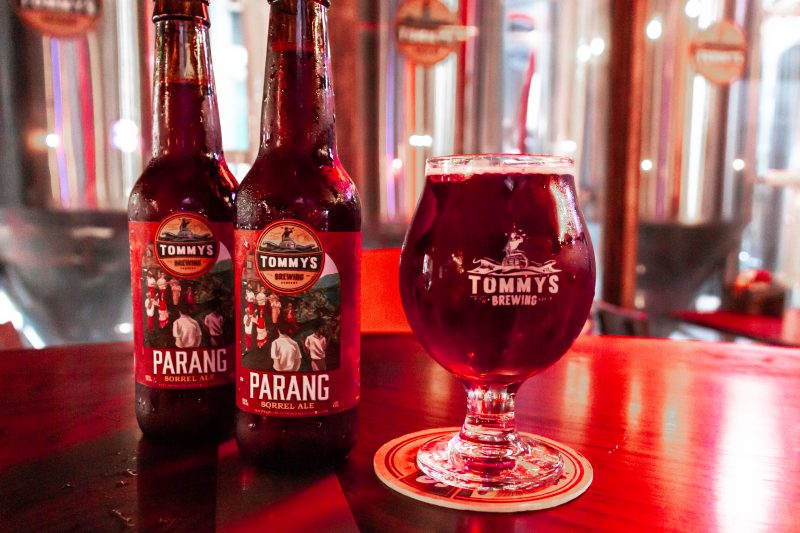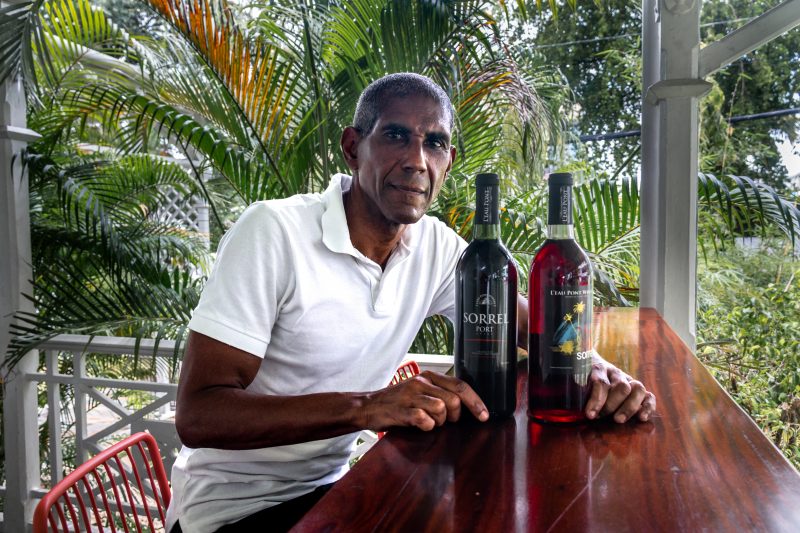Sorrel: The Tart Flower Inspiring Trinidadian Brewers & Vintners

If you haven’t tried sorrel, you haven’t experienced Trinidadian Christmas. The tart flower after which the drink is named belongs to the hibiscus family, though with its tulip-like shape and tough, punctuated petals, you would never know it at first glance.
On the lush, Caribbean island of Trinidad, the bellows of Tommy’s Brewing are rife with the creative musings of head brewer Satyamohan Tripathy and brand manager Bryan Elias.
It’s September, but forget about fall—preparations for Christmas are already underway. Tripathy and Elias are toying with a new recipe for the seasonal brew that enchants their patrons year after year, the prize ingredient a flower whose flavour is inextricably linked to the spirit of a Trinidadian Christmas—sorrel.
“With Trinidad being such a community and family-oriented place, Christmas is a time when everybody gets together,” says Elias. “It’s about open houses, everybody makes tons of food, and sorrel is just such an integral part of that.”
Sorrel, or Hibiscus sabdariffa, is a plant whose history in the Caribbean goes back some 400 years. Some call it roselle, others flor de Jamaica. Soaked overnight then boiled along with sweet seasonings like cloves, orange peels, cinnamon, nutmeg—and in most households, plenty sugar—its flowers are used to produce a bold scarlet beverage. Strained, then served on ice, sorrel the drink yields a medley of flavours punctuated by sorrel the flower’s naturally tart and earthy taste.
Owing to its rich red hue, its habit of blooming well into December, and the fact that it grows readily on the island, it’s no wonder that sorrel has long been considered the crop of Christmas in Trinidad. Usually served virgin, with the option to spike a cup with a splash of rum, sorrel isn’t alcoholic by nature. But across Trinidad, winemakers, distillers, and brewers, like Tripathy and Elias, are changing that, producing festive, cheek-warming pours perfect for celebrating the holidays.

From left, Bryan Elias and Satyamohan Tripathy of Tommy’s Brewing, Trinidad’s first and only craft brewery. Photo credit: Jade Prévost-Manuel
Tommy’s first sorrel beer—Tommy’s Naughty Xmas Ale—came on the scene shortly after the craft brewery opened in 2018. Since then, its seasonal sorrel releases have been rebranded as Parang, named for the folk-style music popular during the holidays.
“It’s been a constantly evolving thing, because the recipe has been different every year,” says Elias of the brew whose descendants have been a staple on Tommy’s seasonal menu ever since. “Our sorrel offering has been a beer, a beer-cider hybrid, and this year, it’ll be a cider.”
Untouched, sorrel is bitter to the taste. Much like with rhubarb stalks or cranberries, drinks brewed from the flower rely on sugar to make them palatable. But the extra sugar is a selling point in Trinidad, where “the palate is very sweet,” says Elias. So much so that this year, Tommy’s Brewing—the island’s first and only craft brewery—plans to double their production of Parang to keep up with local demand. Last year, bottle stocks of the release sold out within two weeks.
To taste Parang is bliss, but to create it is an exercise in creativity. Producing beer from a flower that lacks the natural sugars needed for fermentation means “forgetting all the old-school brewing standards,” says Tripathy. He builds Parang from a base beer of his design before adding in steeped, prepared sorrel that is seasoned with Tommy’s secret blend of Christmas spices to create the blend.

Tommy’s Brewing’s 2021 release of Parang, poured and served. Photo credit: Jade Prévost-Manuel
Vintner David Isaac has also had to do his fair share of tinkering to produce wine from the tart flower. In the laboratory of his micro-winery in Diego Martin, a suburb west of the capital Port of Spain, Isaac adds sugar along with tannins and acids—all of which sorrel naturally lacks—to a fresh batch of his port-style sorrel wine. Bringing a sorrel wine to life requires extra work, precision, and care. But for Isaac, the pay-off is worth it. His port-style wine is a product that the chemical engineer has spent the better part of a decade refining. It is the shelf-worthy descendant of nearly 30 iterations tried and tested over the years.
Isaac’s micro-winery, L’Eau Pont Winery, specializes in the production of tropical fruit wines, made from local crops like cocoa, banana, passionfruit, and pomerac. But his sorrel wines—a port-style wine and a standard wine made from the eponymous flower—are popular favourites that grace tables and wine racks across the country during the Christmas season and well into the year.
“Taking sorrel, drawing the flavor out, and making a drink [out of it], that’s been a tradition in Trinidad for well over 100 years,” says Isaac.
Fermenting sorrel wines—especially those of a high enough quality to take to market—is a less developed tradition, but it’s one that Isaac has dedicated himself to shaping with what he describes as scientific precision.

Isaac’s passion for winemaking started as a hobby he shared with his father before it became both a business and vocation. Having grown up on sorrel, he was determined to produce a sorrel wine he could confidently take to market. Photo credit: Jade Prévost-Manuel
Each batch of the vintner’s sorrel wine and sorrel port-style wine is matured for a minimum of 12 months before it is quality-assured, bottled, then sold locally at artisan markets, gourmet stores, and at TWEE, a Duty-Free store in Trinidad’s main airport, Piarco International. Batches must be carefully planned over a year in advance, and each is monitored during fermentation, tweaked to ensure each batch’s acidity, preservative concentrations, and flavour is up to par.
Given the need to introduce the right amount of sugar, tannins, and acids into each batch, flavour is all that sorrel really brings to the wine, says Isaac. Yet look beyond the fermentation process, and it carries a far greater importance.
“A lot of the Trinidad diaspora living in places like Toronto, Miami, New York, they ask their friends and family [here in Trinidad] to buy our bottles and bring it abroad for them,” says Isaac. “[Our sorrel wines], they’ve become not just these Christmas drinks anymore, but a wine drank throughout the year, made from sorrel.”
It’s the cool drink that transports a homesick Trinidadian to their mother, cousin, or friend’s kitchen, to memories of Caribbean Christmas merriment on the warm tropical island. It’s the flavour that reminds people of the happiest of times, of homecooked meals, trespasses forgotten, and resolutions made anew—moments folks want to remember long after December 31st arrives.
1 https://www.britannica.com/plant/roselle-plant
Feature photo credit: Jade Prévost-Manuel
